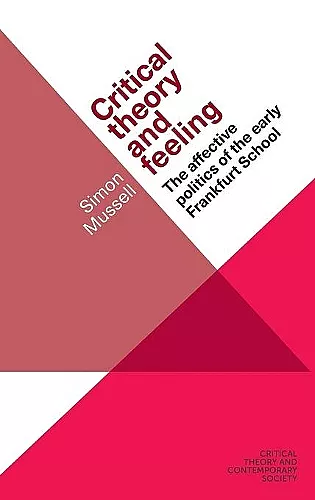Critical Theory and Feeling
The Affective Politics of the Early Frankfurt School
Format:Hardback
Publisher:Manchester University Press
Published:2nd Nov '17
Currently unavailable, and unfortunately no date known when it will be back

This bookoffers a unique and timely reading of the early Frankfurt School in response to the recent ‘affective turn’ within the arts and humanities. Resisting the overly rationalist tendencies of political philosophy, it argues that critical theory actively cultivates a powerful connection between thinking and feeling, and rediscovers a range of often neglected concepts that were of vital importance to the first generation of critical theorists, including melancholia, hope, (un)happiness, objects and mimesis. In doing so, it brings the dynamic work of Walter Benjamin, Theodor Adorno, Ernst Bloch and Siegfried Kracauer into conversation with more recent debates around politics and affect. An important intervention in the fields of affect studies and social and political thought, Critical theory and feeling shows that sensuous experience is at the heart of the Frankfurt School’s affective politics.
'From new materialism to affect theory to object-oriented ontology/speculative realism, the Frankfurt School and critical theory have seldom been swept up into their escape velocities. Simon Mussell’s book strikes like a force of gravity, a dialectical rebalancing that sturdies one’s feet before launch, rekindling the historical-materialist engines that drive critique’s politics to a full head of steam, shaking off whatever dust presumably clings to the Frankfurt School in order to show how emerging thought can always shudder in its orbit.'
Gregory J. Seigworth, Professor of Communication Studies, Millersville University
‘In a Brexit, Trump and “post-truth” world, Simon Mussell gives us first-generation critical theory tools to think through the emotional politics and political emotions of contemporary discontent. Chapters focused on hope, conscious un/happiness, and “entanglement of human beings, capital and objects” create a persuasive case for understanding the centrality of feelings in and for progressive social change.’
Catherine Lane West-Newman, Senior Lecturer in Sociology and Criminology, University of Auckland
ISBN: 9781526105707
Dimensions: unknown
Weight: unknown
168 pages